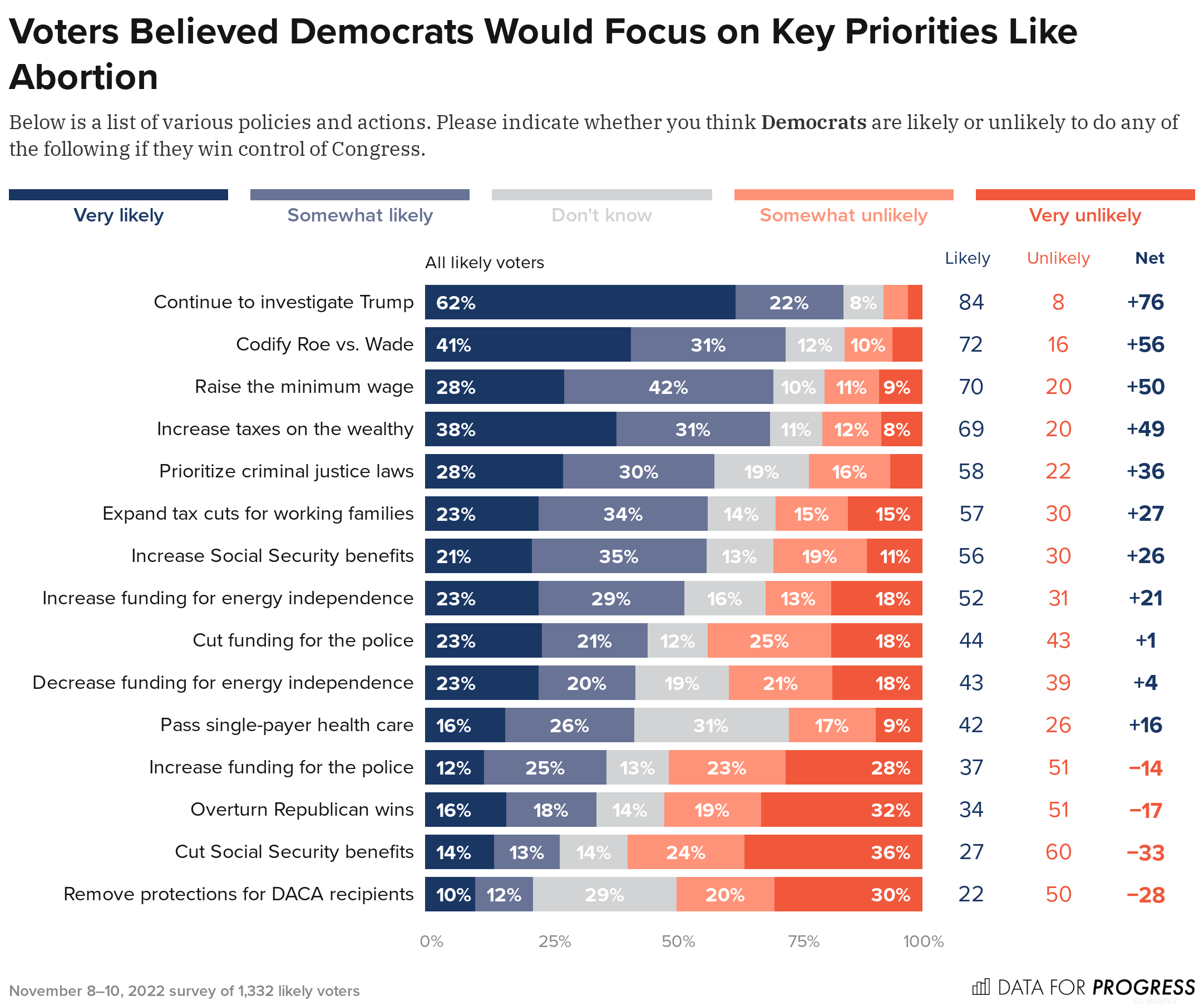2022 Voters Rejected Republican Priorities
By Tenneth Fairclough II
Introduction
The Republican Party gained control of the U.S House of Representatives with a slim majority in the November midterm elections. A Data for Progress poll of 1,332 likely voters nationally conducted during the week of the election gauged voters’ perceptions on the future of U.S politics. We found that voters overwhelmingly believed that the political party in power will pass laws only to benefit itself. Voters also strongly believed Democrats would have prioritized actions like continuing to investigate Donald Trump and codifying Roe v. Wade if they had maintained control of Congress, while believing that Republicans would focus on actions like blocking President Biden’s judicial nominations and opening investigations into his family, including Hunter Biden. Lastly, voters said they would be more upset if Republicans acted on extremist positions, like cutting Social Security and overturning election results.
Voters’ Attitudes Toward the Next Two Years
We first asked voters whether they believed broad scenarios about democracy and threats to it were likely or unlikely to happen in the next two years. We found that 76 percent of voters believed that in the next two years the political party in power will pass laws that benefit itself. Also, 71 percent of voters believed political parties that disagree with election results will overturn them. Voters believed more political violence from both the far-right (+29-point margin) and far-left (+28-point margin) was likely over the next two years, and also anticipated increased voter fraud in elections (+10-point margin).
Voters’ Attitudes Toward Party Priorities
Next, we examined what voters believed each party would be likely or unlikely to do if it won control of Congress, and which policies or actions would upset them the most.
At least 70 percent of voters believed that if the Democrats had won control of Congress, they would be likely to continue investigating Trump (+76-point margin), codify Roe v. Wade (+56-point margin), and raise the minimum wage (+50-point margin). A majority of voters also believed if Democrats won control of Congress, they would increase taxes on corporations and the wealthy (+49-point margin), prioritize criminal justice laws (+36-point margin), expand tax cuts for working families (+27-point margin), increase Social Security benefits (+26-point margin), and increase funding for energy independence (+21-point margin).
We then asked voters how upset they would be if Democrats acted on the various policies and actions we tested above. Three-quarters of voters (79 percent) would be “very” or “somewhat” upset if Democrats cut Social Security benefits. The previous results show that only 27 percent of voters believed that Democrats would be likely to do this; however, it is clear this is an issue voters care deeply about. Sixty-nine percent of voters would also be “very” or “somewhat” upset if Democrats cut funding for the police and 68 percent would be “very” or “somewhat” upset if Democrats were to overturn Republican wins in elections. However, similar to the previous result on Social Security, overturning election results is not something voters associate with Democrats: Voters thought this was unlikely to happen by a -17-point margin.
More importantly, voters would not react negatively to a number of Democratic priorities. For example, 62 percent of voters said they wouldn’t be upset at all if Democrats were to increase Social Security benefits. Voters also said they would not be upset at all if Democrats acted on other key priorities like expanding tax cuts for working families (46 percent), raising the minimum wage (47 percent), and increasing taxes on corporations and the wealthy (47 percent).
Next, we examined which policies and actions voters believed Republicans would be likely to do if they won control of Congress. At least 70 percent of voters believed Republicans would both block President Biden’s federal judge nominations and open investigations on Hunter Biden and the Biden family. We also found that voters believed Republicans would very likely focus on the following actions: passing a federal law to ban abortion after 15 weeks of pregnancy ( +50-point margin), preventing the Department of Justice from investigating Trump (+42-point margin), and building a border wall between the U.S and Mexico (+38-point margin).
Then, we asked how upset voters would be if Republicans acted on these policies and actions. Eighty-three percent of likely voters said they would be “very” or “somewhat” upset if Republicans were to cut Social Security and Medicare. Voters also said they would react quite negatively if Republicans made it more difficult to vote and changed election rules so they could overturn the elections that Republicans lost (68 percent). Voters would also react negatively to other Republican priorities, saying they would be “very” or “somewhat” upset if Republicans were to give tax breaks to corporations and the wealthy and cut funding to prevent future pandemics (66 percent). This also included overturning the results of elections Democrats won and shutting the government down to avoid reaching a deal with Democrats on the debt ceiling (65 percent).
Conclusion
Our poll shows voters are broadly concerned about political parties only prioritizing policies that benefit the party, rather than the voters the party represents. We also find that voters would react more negatively toward Republican priorities like overturning election results, making it harder to vote — and most importantly — cutting essential programs like Social Security and Medicare, ultimately showing that this election was a statement from voters to reject the extremist policies the Republican Party holds. As we turn our sights to the 2024 election cycle, Democrats should continue to repeatedly highlight the out-of-touch positions of the Republican Party.
Tenneth Fairclough II (@tenten_wins) is a polling analyst at Data for Progress.





